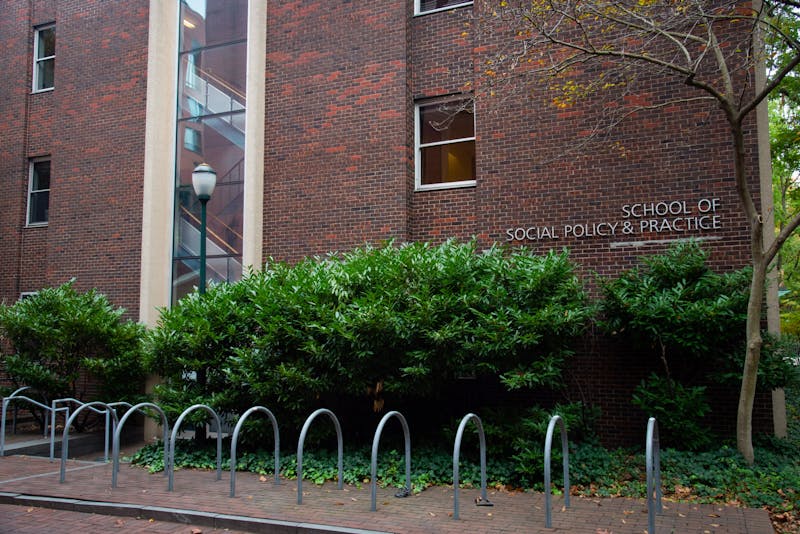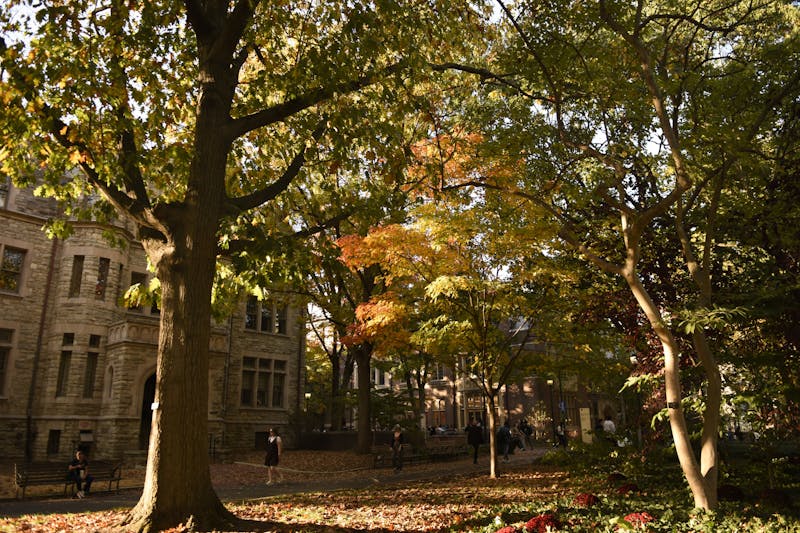
Penn's Board of Trustees voted on campus renovation plans and discussed the impacts of 1968 Wharton graduate, former president, and President-elect Donald Trump's victory on the University at their annual fall meetings.
The Board of Trustees met over the course of two days on Nov. 14 and 15 at The Inn at Penn, during which they approved the creation of a new College of Liberal and Professional Studies master's program focused on police practice and criminology as well as multiple large scale renovation projects. The Trustees also discussed the University's priorities given a "challenging" political environment, as well as opportunities to utilize artificial intelligence.
During the meeting of the Local, National, and Global Engagement Committee, Graduate School of Education Dean Katharine Strunk presented on GSE's new strategic vision — titled "Together for Good: A Vision for Transformational Impact" — which was announced in early November. The proposal is the first strategic initiative undertaken by GSE in two decades.
The initiative is intended to increase collaboration between GSE and members of the community with the hopes of being a world leader in "producing consequential research and preparing learners to be impactful educational practitioners, scholars, and changemakers."
Jeffrey Cooper, the University's Vice President of Government Affairs, discussed priorities for the University given a "challenging" political environment. Topics included tax policy, research funding, student aid programs, immigration, and institutional governance.
"My goal today is really not necessarily to speculate about policies, but to outline what Penn's priorities are, recognizing that we are in a very challenging and changing environment,” Cooper said.
Cooper did not mention Trump by name, but referenced Republican majorities in the United States House of Representatives and Senate.
He also addressed the U.S. House Committee on Education & the Workforce's congressional probe into Penn over the last year, which demanded documents from the University regarding the administration's response to alleged campus antisemitism. He expressed an expectation for increased government involvement moving forward, particularly in regard to political and social issues.
At the Facilities and Campus Planning Committee meeting, Penn's Sustainability Office announced the fourth iteration of the University's Climate and Sustainability Action Plan. The roadmap will focus on how Penn can reach carbon neutrality goals, improve single-stream recycling, and reduce single occupancy vehicles.
Facilities and Real Estate Services Senior Vice President Anne Papageorge announced a $17.8 million renovation plan for Fisher Fine Arts Library. According to Papageorge, the renovation process will go through November 2026.
Representatives from the University of Pennsylvania Health System discussed a $220 million project to expand UPHS's Radiation Oncology department and invest in proton therapy capabilities.
At the Student Life Committee meeting, 1989 Engineering graduate and Penn Trustee Michael Barrett described the process of registering events for Homecoming Day as "very restrictive" and said it "limits the ability for fellowship." The comments were made during a discussion about the University's "approach to addressing substance abuse," which was led by Associate Provost and Chief Wellness Officer Benoit Dubé and University Life Associate Vice Provost Sharon Smith.
Ahead of Homecoming weekend this year, Penn banned daytime parties — a decision which the University attributed to new event policies.
"Even though the university is well resourced, we have to manage with what we have in terms of the amount of folks on campus at night and on weekends," Smith said.
During the meeting of the Academic Policy Committee, Associate Dean for the Social Sciences and sociology professor Emily Hannum and Vice Dean for Professional and Liberal Education Nora Lewis presented a resolution to establish a Master of Applied Criminology and Police Leadership in the School of Arts and Sciences.
The LPS degree, according to Hannum and Lewis, will focus on theories of crime, analytic methods, and policy analysts, and include coursework in leadership, dynamics of community engagement, and program evaluation. The degree will launch in fall 2025 with an initial cohort of 15 students, and aims to enroll 30 students by fall 2027.
The meeting also included a discussion of "Strategic Initiatives in Data Science and Artificial Intelligence" with Penn faculty members. Perelman School of Medicine professor Marylyn Ritchie addressed the role that AI can play in sophisticated modeling and how students should engage with AI at Penn.
"A student shouldn't leave Penn before knowing here to se AI and how to be careful with it," Ritchie said. "We need to know how to educate everyone about AI."
Data Driven Discovery Initiative Director and physics professor Bhuvnesh Jain discussed Penn's new AI Council, which was established earlier this month to lead and coordinate the University's AI community. The council — which is led by five senior faculty members — will provide strategic input, coordinate multidisciplinary research, and develop new AI-related initiatives. The announcement wrote that the council's establishment is "a major step" in implementing "In Principle and Practice," Penn's strategic framework.
"There’s huge potential for what we can do for students and for new interdisciplinary research and no university is doing that," Jain said.
AI use was also brought up by Strunk during an earlier meeting, who advocated for GSE faculty to incorporate AI into their teaching rather than discourage students from using the technology.
The Board voted to allocate $11.25 million to proceed with the construction of a new Physical Sciences Building and the renovation of the David Rittenhouse Laboratory. In addition to these initiatives, the University will also invest $5 million more in a project to renovate multiple floors at 3600 Civic Center Boulevard for the Perelman School of Medicine and $17 million for the construction of the new Gail P. Riepe Center for Advanced Veterinary Education.
After the Board approved a resolution during the meeting, Stuart Weitzman School of Design Dean Frederick Steiner's appointment was extended. Interim Penn President Larry Jameson and Provost John Jackson Jr. announced the extension for Steiner, whose deanship was previously set to end on Nov. 7, 2025. Steiner, who is in his eighth year as dean, previously had his contract extended in 2021.
Staff reporters Vivi Sankar, Ethan Young, Gabriel Huang, Alex Slen, Sophia Powell, and Naija Agarwal contributed reporting to this article.
The Daily Pennsylvanian is an independent, student-run newspaper. Please consider making a donation to support the coverage that shapes the University. Your generosity ensures a future of strong journalism at Penn.
Donate











